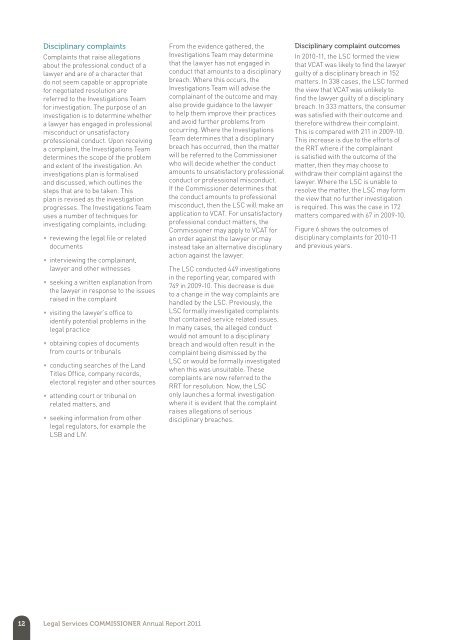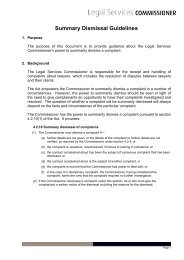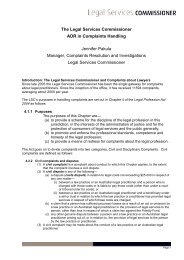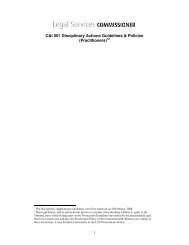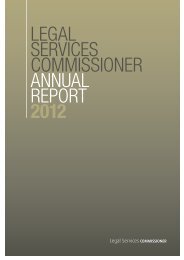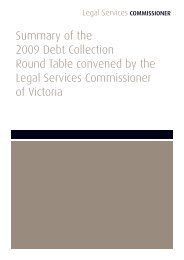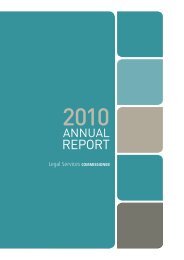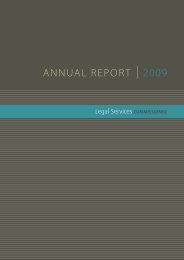Annual Report 2011 - Legal Services Commissioner
Annual Report 2011 - Legal Services Commissioner
Annual Report 2011 - Legal Services Commissioner
You also want an ePaper? Increase the reach of your titles
YUMPU automatically turns print PDFs into web optimized ePapers that Google loves.
Disciplinary complaints<br />
Complaints that raise allegations<br />
about the professional conduct of a<br />
lawyer and are of a character that<br />
do not seem capable or appropriate<br />
for negotiated resolution are<br />
referred to the Investigations Team<br />
for investigation. The purpose of an<br />
investigation is to determine whether<br />
a lawyer has engaged in professional<br />
misconduct or unsatisfactory<br />
professional conduct. Upon receiving<br />
a complaint, the Investigations Team<br />
determines the scope of the problem<br />
and extent of the investigation. An<br />
investigations plan is formalised<br />
and discussed, which outlines the<br />
steps that are to be taken. This<br />
plan is revised as the investigation<br />
progresses. The Investigations Team<br />
uses a number of techniques for<br />
investigating complaints, including:<br />
• reviewing the legal file or related<br />
documents<br />
• interviewing the complainant,<br />
lawyer and other witnesses<br />
• seeking a written explanation from<br />
the lawyer in response to the issues<br />
raised in the complaint<br />
• visiting the lawyer’s office to<br />
identify potential problems in the<br />
legal practice<br />
• obtaining copies of documents<br />
from courts or tribunals<br />
• conducting searches of the Land<br />
Titles Office, company records,<br />
electoral register and other sources<br />
• attending court or tribunal on<br />
related matters, and<br />
• seeking information from other<br />
legal regulators, for example the<br />
LSB and LIV.<br />
From the evidence gathered, the<br />
Investigations Team may determine<br />
that the lawyer has not engaged in<br />
conduct that amounts to a disciplinary<br />
breach. Where this occurs, the<br />
Investigations Team will advise the<br />
complainant of the outcome and may<br />
also provide guidance to the lawyer<br />
to help them improve their practices<br />
and avoid further problems from<br />
occurring. Where the Investigations<br />
Team determines that a disciplinary<br />
breach has occurred, then the matter<br />
will be referred to the <strong>Commissioner</strong><br />
who will decide whether the conduct<br />
amounts to unsatisfactory professional<br />
conduct or professional misconduct.<br />
If the <strong>Commissioner</strong> determines that<br />
the conduct amounts to professional<br />
misconduct, then the LSC will make an<br />
application to VCAT. For unsatisfactory<br />
professional conduct matters, the<br />
<strong>Commissioner</strong> may apply to VCAT for<br />
an order against the lawyer or may<br />
instead take an alternative disciplinary<br />
action against the lawyer.<br />
The LSC conducted 449 investigations<br />
in the reporting year, compared with<br />
749 in 2009-10. This decrease is due<br />
to a change in the way complaints are<br />
handled by the LSC. Previously, the<br />
LSC formally investigated complaints<br />
that contained service related issues.<br />
In many cases, the alleged conduct<br />
would not amount to a disciplinary<br />
breach and would often result in the<br />
complaint being dismissed by the<br />
LSC or would be formally investigated<br />
when this was unsuitable. These<br />
complaints are now referred to the<br />
RRT for resolution. Now, the LSC<br />
only launches a formal investigation<br />
where it is evident that the complaint<br />
raises allegations of serious<br />
disciplinary breaches.<br />
Disciplinary complaint outcomes<br />
In 2010-11, the LSC formed the view<br />
that VCAT was likely to find the lawyer<br />
guilty of a disciplinary breach in 152<br />
matters. In 338 cases, the LSC formed<br />
the view that VCAT was unlikely to<br />
find the lawyer guilty of a disciplinary<br />
breach. In 333 matters, the consumer<br />
was satisfied with their outcome and<br />
therefore withdrew their complaint.<br />
This is compared with 211 in 2009-10.<br />
This increase is due to the efforts of<br />
the RRT where if the complainant<br />
is satisfied with the outcome of the<br />
matter, then they may choose to<br />
withdraw their complaint against the<br />
lawyer. Where the LSC is unable to<br />
resolve the matter, the LSC may form<br />
the view that no further investigation<br />
is required. This was the case in 172<br />
matters compared with 67 in 2009-10.<br />
Figure 6 shows the outcomes of<br />
disciplinary complaints for 2010-11<br />
and previous years.<br />
12 <strong>Legal</strong> <strong>Services</strong> COMMISSIONER <strong>Annual</strong> <strong>Report</strong> <strong>2011</strong>


